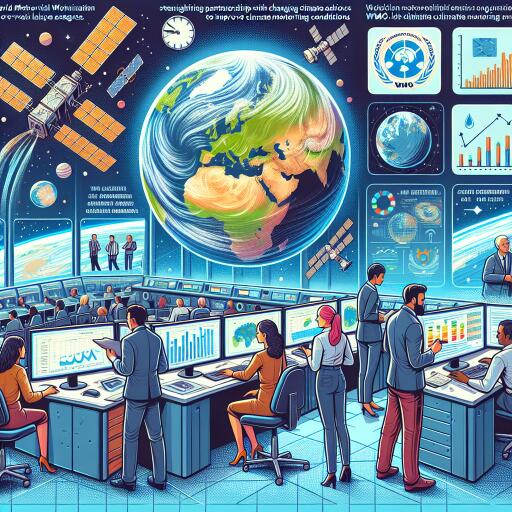
Expanding Horizons: Enhanced Space Agency Collaboration to Revolutionize Climate Monitoring
In an era where the rapid pace of climate, societal, and technological changes presents both a challenge and an opportunity, the World Meteorological Organisation (WMO) is taking a significant step forward. The organization is embarking on a journey to deepen its partnership with space agencies around the globe. This ambitious initiative is aimed at maximizing the use of satellite observations, which are already foundational to monitoring Earth’s climate and weather patterns. Remarkably, these space-based systems provide about 90% of the data that feed into global weather prediction models, proving indispensable for National Meteorological and Hydrological Services in their mission to protect lives and properties 24/7 globally.
This move to enhance cooperative efforts isn’t without precedence. The relationship between the WMO community and space agencies has a rich history, central to which has been the sharing of data, standardization of procedures, and the building of capabilities, especially in developing countries. Recognizing the importance of evolving this relationship further, attendees of the 15th Session of Consultative Meetings on High-Level Policy on Satellite Matters have unanimously agreed to elevate this partnership to new heights.
In these critical times, facing the mounting challenges of climate change, efficient management of water resources, and the forecasting of space weather, the importance of collaboration cannot be overstressed. WMO Secretary-General Celeste Saulo highlighted the urgency and necessity of these collaborative efforts, stating, “Today, as we confront emerging challenges such as climate change, water resources management, and space weather forecasting, our collaborative efforts are more vital than ever.”
The recent gathering marked the first of its kind in over half a decade, bringing together top officials from various space agencies and the meteorological community. This includes the presidents of WMO’s Infrastructure and Services Commissions, all focused on how the WMO can best support space agencies in meeting the growing needs for data and information. This includes improving access to and utilization of data from both existing and future satellite systems and playing a crucial role in advancing WMO’s strategic goals like Earth System monitoring and prediction, establishing Early Warnings for All, and the Global Greenhouse Gas Watch initiative.
Celeste Saulo emphasized the potential of utilizing improved Earth observations to not only provide more timely and accurate warnings for communities at risk but also to support informed decision-making in the face of climate change challenges. “Today, we embark on a journey of cooperation and innovation, leveraging our collective expertise to overcome challenges and achieve our shared vision of a safer, more resilient world,” she remarked.
Michel Jean, President of WMO’s Infrastructure Commission, pointed out the impeccable timing of the meeting, noting its significance not just from a scientific and technological standpoint, but also from a governance perspective. He hinted at upcoming sessions aimed at further enhancing this dynamic partnership, including the Coordination Group on Meteorological Satellites and the Committee on Earth Observation Satellites meetings.
The discussions during the meeting were wide-ranging, covering essential topics like aiding members with limited capacity, especially regarding Early Warnings for All and strategies for integrating burgeoning data volumes with user needs. The discourse also ventured into the realm of emerging opportunities for collaboration with the commercial satellite sector, the impact of Artificial Intelligence on weather and climate forecasting, the advancement of WMO’s space program, and the implementation of the WMO Unified Data Policy. This involves defining core and recommended space-based observations across all application areas, aiming to streamline and enhance global climate monitoring efforts significantly.
Through these expanded partnerships and endeavors, the future of climate monitoring and prediction looks brighter, promising a world better equipped to handle the complexities and uncertainties of our changing climate.





Leave a Reply